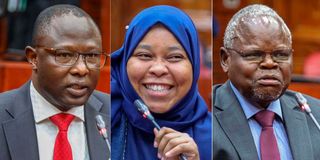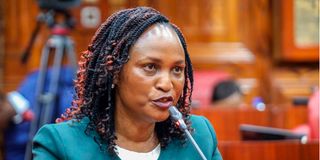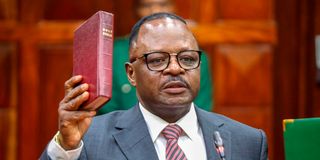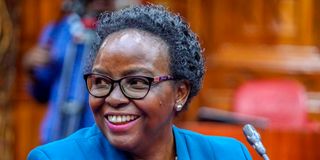New IEBC team finally gazetted

Independent Electoral and Boundaries Commission (IEBC) nominees (from left) Erastus Edung Ethekon, Fahima Araphat Abdallah and Prof Francis Odhiambo Aduol.
What you need to know:
- The three-judge bench said any action taken in contravention of court orders is rendered null and of no legal effect.
- The court said there was no evidence that the nominees were ineligible or that there was no regional balance.
President William Ruto on Thursday evening gazetted the new electoral commission team after a three-judge Bench paved the way for their appointment by knocking out petitions against their suitability, and allowing the Head of State to correct the mistake of gazetting them earlier in the face of an existing court order.
Erastus Edung Ethekon has been appointed as the Chairperson of the IEBC for a six-year term. Additionally, Ann Njeri Nderitu, Moses Alutalala Mukhwana, Mary Karen Sorobit, Hassan Noor Hassan, Francis Odhiambo Aduol, and Fahima Araphat Abdallah have been appointed as members of the Commission, also for a period of six years.

Independent Electoral and Boundaries Commission (IEBC) Commissioner Anne Njeri Nderitu when she appeared before the Justice and Legal Affairs Committee.
In a judgement delivered on Thursday night, a three-judge bench comprising Justices Roseline Aburili, John Chigiti and Bahati Mwamuye said the President appointed the seven people in contravention of an order issued on May 29, 2029 barring their appointment and gazettment pending determination of a petition filed by two Kenyans.
The bench said court orders are not merely suggestions and any action taken in contravention of a court order is null and of no legal effect.
President Ruto gazetted appointment of the nominees on June 10 through two gazette notices, a move that escalated the legal challenge initiated by Mr Kevin Roy Omondi and Boniface Mwangi.
According to the judges, the President should have complied with the court order by waiting for conclusion of court proceedings.
"A nominee cannot take the oath of office based on an illegal appointment. A court cannot sanction an illegality. To uphold rule of law and legitimacy of the IEBC to the people of Kenya, an illegality cannot be the foundation of legitimacy. The two gazette notices were issued in direct contravention of valid court orders. Their appointment was unlawful null and void," said the judges.

Independent Electoral and Boundaries Commission (IEBC) Commissioner Dr Moses Alutalala Mukhwana takes his oath when he appeared before the Justice and Legal Affairs Committee.
However, the court dismissed the petition and upheld the President's nomination of the commissioners after finding that there was no evidence of irregularity or proof of Constitutional breach or bias.
The court said there was no evidence the nominees were ineligible or there was no regional balance.
According to the court, the former provinces were not constitutionally recognized and the court could not analyze the background of the nominees based on the provinces.
Hence, the court found that there was no evidence to show that more than one nominee was from the same community or region.
The target for this argument was Mr Ethekon and Ms Sorobit, whom the petitioners claimed were from the Rift Valley province. But the court noted both were from different ethnic groups and that Mr Ethekon was from Turkana County and Ms Sorobit from Uasin Gishu county.

Independent Electoral and Boundaries Commission (IEBC) Commissioner Mary Karen Sorobit when she appeared before the Justice and Legal Affairs Committee.
In addition, the court found that there was a disconnect between the alleged violations of the Constitution and the reliefs sought by the petitioners.
"Constitutional Petitions must be well particularized and must be specific in the manner in which the allegations occurred and the violators. This petition failed to meet the reasonable precision test. For failure to articulate how the Constitution bill of rights was violated or threatened, this court finds it fell short of the threshold to invoke court's jurisdiction in Article 22 and 23 of the Constitution," said the bench.


